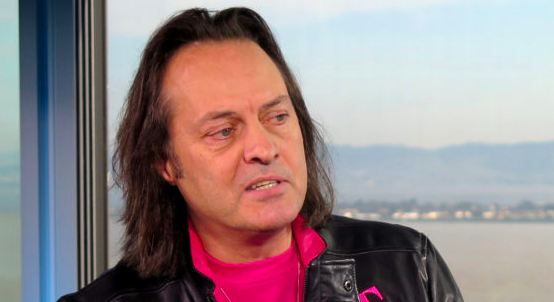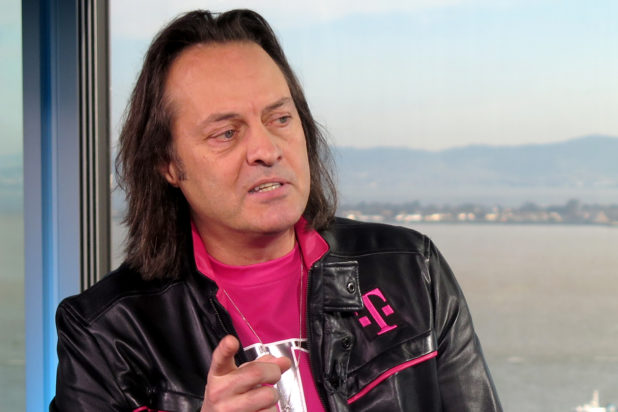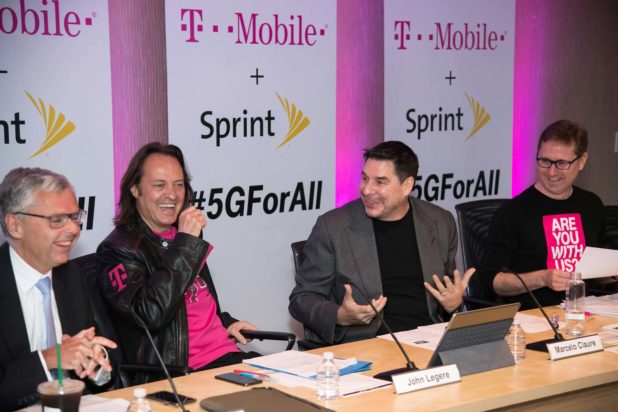Andrew Anglin
Daily Stormer
April 30, 2018
What the hell is wrong with this asshole?
I thought Donald Trump was supposed to be preventing these mega mergers.
I also remember something about passing a law that men in their fifties had to cut their hair to a reasonable length and not wear leather jackets with pink accents, though I might have dreamed that part.
Your choice in phone carriers is about to drop by one, as T-Mobile and Sprint announced their long-awaited plans to merge today (April 29).
The $26 billion deal will combine the third- and fourth-largest carriers in the U.S. and create what one T-Mobile executive touted as the nation’s highest-capacity network. John Legere, T-Mobile’s CEO who will remain in charge of the combined company, says that the newly merged T-Mobile will have 30 times the network capacity that it does today once the deal closes.
I’m no mathicist, but that doesn’t strike me as a plausible claim.
Also, these guys’ press conference looked like a panel at a porno convention.
What kind of a country are we running here?
When that will be remains subject to regulatory approval, though Sprint and T-Mobile are eyeing the first half of 2019. Both the Federal Communications Commission and the U.S. Department of Justice have to OK the deal, and that’s been a roadblock to such mergers in the past. A combination of AT&T and T-Mobile in 2011 was scuttled in the face of regulatory opposition, while Sprint and T-Mobile called off merger talks in 2014 after regulators indicated they would oppose that deal.
Of course, those mergers fell apart under a very different presidential administration. T-Mobile and Sprint pitched their new proposed merger in terms that seemed geared toward resonating with the current administration, touting benefits for global competitiveness and job growth.
Yeah, job growth from a merger, lol.
I’m no econatician, but that doesn’t strike me as a plausible claim.
Their announcement video is clearly designed to woo Trump and his people.
https://youtu.be/1nsbmtwMrgY
But come on.
When I hear someone say “this gigantic corporate merger will create jobs” I think of emails about pills that will increase the size of my penis.
John Legere actually looks like the ideal type of a guy who would send me such an email.
What’s next from these assholes?
A sex metaphor about how they’re going to fuck America?
Both Legere and Sprint CEO Macrelo Claure, who will remain on the board of the combined company, said the merger was essential for speeding up the transition to the 5G networking standard in the U.S. That deployment is expected to begin by year’s end, with the first 5G-enabled phones arriving in 2019. “What happens in the first few years of a new technology is crucial,” Claure said in a video with Legere announcing the merger.
“Only the new T-Mobile will have network spectrum and technology to quickly create a broad and deep 5G network in the first few years of the 5G innovation cycle,” Legere added.
Welp.
Just So You Understand
Companies have a bunch of jobs that need done for the company. When two companies merge, you then have a bunch of situations where you have two people doing the same job. So one of those persons is necessarily fired, because there is no reason to have two people doing the same job.
Corporate mergers always, always, always cost people jobs. In fact, that is one of the biggest drives behind the process – they save money by cutting out a bunch of employees.
Also, this whole thing of massive corporations continuing to merge into more massive corporations really is like a dystopian nightmare from science fiction. This was exactly what was predicted by Robert Heinlein and Philip K. Dick. And a whole bunch of other sci-fi writers.
Megacorporation, mega-corporation, or megacorp, a term popularized by William Gibson, derives from the combination of the prefix mega-with the word corporation. It has become widespread in cyberpunk literature. It refers to a corporation (normally fictional) that is a massive conglomerate(usually private), holding monopolistic or near-monopolistic control over multiple markets (thus exhibiting both a horizontal and a vertical monopoly). Megacorps are so powerful that they can ignore the law, possess their own heavily armed (often military-sized) private armies, be the operator of a privatized police force, hold “sovereign” territory, and even act as outright governments. They often exercise a large degree of control over their employees, taking the idea of “corporate culture” to an extreme. Such organizations as a staple of science fiction long predate cyberpunk, appearing in the works of writers such as Philip K. Dick (Do Androids Dream of Electric Sheep?, 1968), Thea von Harbou (Metropolis, 1927), Robert A. Heinlein (Citizen of the Galaxy, 1957), Robert Asprin (The Cold Cash War, 1977), Andre Norton (the Solar Queen novels) and David Weber (“the “Honorverse” novels). The explicit use of the term in the Traveller science fiction roleplaying game from 1977 predates Gibson’s use of it.
Trump needs to be like “hey yeah, no. And cut that hair, hippie.”



